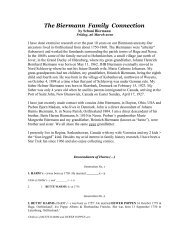A Collection of Dad's Essay's & Writings - Welcome
A Collection of Dad's Essay's & Writings - Welcome
A Collection of Dad's Essay's & Writings - Welcome
Create successful ePaper yourself
Turn your PDF publications into a flip-book with our unique Google optimized e-Paper software.
- THE QUALITY OF LIFE -<br />
“The Quality <strong>of</strong> Life is more important<br />
than Life itself”<br />
he most significant meaning <strong>of</strong> the word “quality”, according to the Waverly Dictionary based on Dr.<br />
Samuel Johnson's work, is that it refers to the nature or characteristic <strong>of</strong> anything, as well as that it<br />
signifies a degree <strong>of</strong> excellence. It is the latter meaning that is under scrutiny as it pertains to human<br />
existence. Dr. Johnson remarks that quality is better than quantity, but a large segment <strong>of</strong> mankind<br />
has opted for the latter, thereby losing many <strong>of</strong> the joys <strong>of</strong> living. The larger segment <strong>of</strong> this discourse<br />
will highlight a few <strong>of</strong> the major conditions, events and changes that took place during the 19th<br />
century in Europe and how it affected the lives <strong>of</strong> citizens.<br />
It is unfortunate that the quality <strong>of</strong> life eludes many because <strong>of</strong> personal disaster, tragedy, sickness, poverty and<br />
war. It is equally unfortunate that too many do not attain to that level simply because they do not strive for it or are<br />
not given the opportunity to enjoy it. The pressure <strong>of</strong> taking care <strong>of</strong> the necessities <strong>of</strong> life is a plague that takes much<br />
<strong>of</strong> the pleasure away from many. For those who are able to look after the luxuries and let the necessities take care <strong>of</strong><br />
themselves, have a good recipe for the pursuit <strong>of</strong> happiness. Economics and politics have been the major influences<br />
on individuals throughout history, but the changes that were needed for a higher standard <strong>of</strong> living came about slowly<br />
and with difficulty. The lifestyles and the opportunities <strong>of</strong>fered differ in various ages throughout history and differ in<br />
various cultures. It is a sad comment that in the early years <strong>of</strong> the 21st century there are huge disparities between the<br />
very rich and the very poor and that homelessness should be part <strong>of</strong> current society.<br />
There is a trite phrase that mentions "the good old days" which is an idealized vision <strong>of</strong> ages gone by and which is<br />
a romanticized nostalgia that sometimes clouds historical reality. But having said that, those who ignore history, may<br />
well make the mistakes that create unnecessary problems. Each age and each country can boast some contribution to<br />
the improvement <strong>of</strong> life for its citizens and historians can record the miseries <strong>of</strong> life in those good old days. It would<br />
take a good sized volume to give a complete picture <strong>of</strong> all the events that have brought mankind to the point where<br />
many can enjoy a certain quality <strong>of</strong> life.<br />
Certainly the lowliest <strong>of</strong> beings were mired in poverty while royalty, nobility and those in authority were ever<br />
fearful <strong>of</strong> losing their power to rivals. There is evidence that the lifespan in the first 1800 years after the beginning <strong>of</strong><br />
the Christian era was short for most citizens. Even in the early years <strong>of</strong> the 19th century lifespan was averaged at 30.<br />
There is one medieval anecdote that has come down through the ages that may well illustrate that certain minor<br />
adjustments meant a great deal to those whose menial existence had some bright moments.<br />
Historians relate that St Bernard <strong>of</strong> Clairveau, who lived from 1091 to 1153, was approached by a priest from a<br />
small rural parish with a problem. He complained that his members were being plagued by an infestation <strong>of</strong><br />
mosquitoes that made attendance at mass intolerable. St. Bernard, who had a reputation for miraculous deeds,<br />
thought for a moment, then assured the priest that on the coming Sunday the pesky mosquitoes would be gone. When<br />
the parish members assembled the following Sunday there were no insects to create discomfort for the congregation.<br />
The priest was thankful and inquired how St. Bernard had managed this miracle. Bernard replied that he had<br />
excommunicated the pesky insects. This wise churchman knew when the mosquito season would end in that district.<br />
It may well be that this small comfort added greatly to the quality <strong>of</strong> life for these peasant parishioners.<br />
The political events and the countless wars are well documented, but not much has been written about the<br />
tradesman, the shopkeeper, the artist, the musician, the writer and persons who did not create wars or dethrone those<br />
in power. A few social histories give an insight into life <strong>of</strong> an average citizen.<br />
It is evident that only in the last 200 years has the opportunity for bettering the lives <strong>of</strong> a large number <strong>of</strong> people<br />
been possible. Ingenuity and what contemporary society calls entrepreneurship have on many occasions created a<br />
better lifestyle but it is in the sphere <strong>of</strong> social action that improvement in living standards was achieved.<br />
What devastated some idealistic form <strong>of</strong> proper lifestyle was disease and the lack <strong>of</strong> proper hygiene and the<br />
discoveries <strong>of</strong> the 19th century in the field <strong>of</strong> germ isolation, prevention and cure came hand in hand with the<br />
Industrial Revolution and dramatic changes in the way mankind lived. The beginnings <strong>of</strong> the Industrial Revolution<br />
did not improve living conditions in the first decades. There were publications on economics that espoused certain<br />
doctrines but not until the idea <strong>of</strong> social legislation did these impact beneficially for the average man. Socialism<br />
became the first reaction <strong>of</strong> the Industrial Revolution. In France, Germany and Britain the new labor laws did little to<br />
alleviate the misery <strong>of</strong> the workers. In the early 19th century an English mill worker could expect eight shillings for a<br />
15 hour day, six days a week. It would be 30 years before even the most elementary reforms would be suggested. For<br />
some the apologia from the more fortunate in life was the thought that “virtue breeds wealth” and “sin breeds<br />
poverty”. It was a convenient explanation from those who had no desire for reform.<br />
The major disruption to an old order in the 18th century came about when the storming <strong>of</strong> the Bastille in Paris<br />
was responsible for the French Revolution and the horrors that followed. It only ended with the battle <strong>of</strong> Waterloo in<br />
June 1815 and the exile <strong>of</strong> a tyrant. It is interesting to note that an uprising similar to the horrifying French<br />
Revolution could not have taken place in another major empire, because good common sense prevailed. The Imperial<br />
House <strong>of</strong> Habsburg was ruled by benevolent autocrats who understood how to keep order in their lands. In Vienna,<br />
there was no storming <strong>of</strong> the H<strong>of</strong>burg Palace, the fortress <strong>of</strong> the absolute. The Austrian Habsburgs were friendly,<br />
urbane, and simple, almost like the citizens they ruled. Herein lays the philosophy widespread throughout a hundred<br />
years <strong>of</strong> German history, that: “A happy people are a contented people”.<br />
It is amazing that something as simple as a dance should influence the political scene and create the theory <strong>of</strong> a







